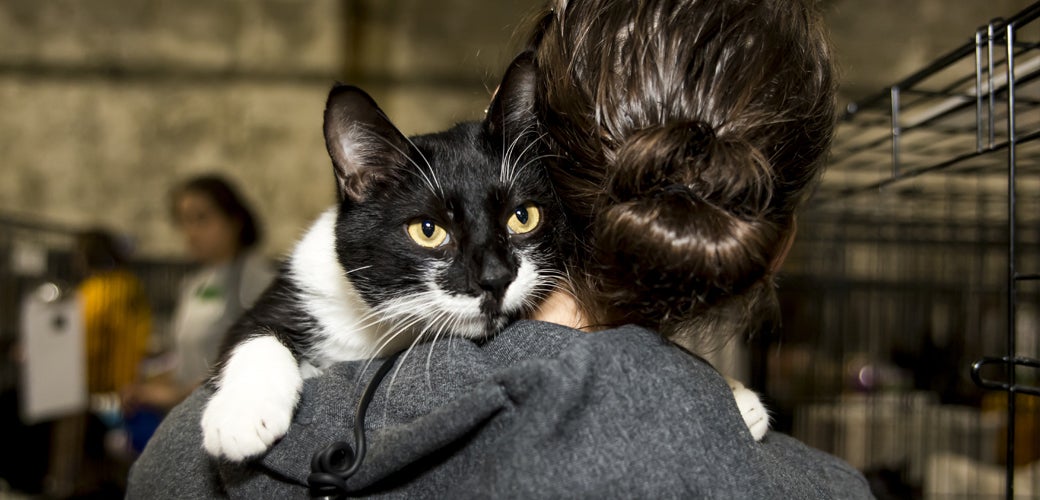
- The ASPCA is working to ensure legislative protections for animals across the country during this difficult time.
- We urge elected officials to deem animal sheltering services, animal care and veterinary services essential functions.
- Federal agencies should consider and incorporate animal welfare into emergency planning.
- You can do your part to speak up for animals by joining the ASPCA’s Regional Advocacy Field Team (RAFT).
With each passing hour, we’re flooded with news alerts about the spread of COVID-19 throughout the country. The ASPCA will continue to track these developments at the local, state and federal levels to ensure that the animals in our communities are cared for and not forgotten. Fortunately, there is currently no evidence that companion animals can become ill with COVID-19 or transmit the virus to people.
As state and local governments enact preventive measures to reduce the further impact of COVID-19, we encourage both elected and regulatory officials to ensure animal sheltering services, animal care and veterinary operations, and related businesses integral to delivery of these services, such as pet food, pharmaceutical and medical supply manufacturers and distributors, are included as “essential.” The initial shelter in place orders issued by seven Bay Area counties in Northern California defined pets as family members and recognized activities to secure pet food and pet care as essential activities—such recognition and allowances are critically important for any shelter in place mandates. Since these orders were first issued, many local governments and states have also issued shelter in place or “stay at home” orders. Many explicitly designate veterinary services as an essential healthcare operations and include pets as family members or make clear that essential activities include caring for pets and other animals, including farm animals. As more state and local governments issue these orders in the coming days and weeks, it is essential that this pattern continues and those orders include these critical designations for animals.
At the same time, officials should take into account the operational challenges that animal shelters and veterinary professionals face due to this crisis. Staff shortages due to illness or quarantine, social distancing practices, the need to conserve personal protective equipment and limitations on elective surgical procedures, make providing the full range of critical sheltering services, including spay/neuter surgeries, nearly impossible in many locations for the immediate future. In order for animal shelters to be able to continue caring for animals as well as provide emergency services to animals in their communities, creativity and flexibility will be required, particularly where existing law requires spay/neuter prior to adoption. While most jurisdictions permit adoption with an agreement to spay/neuter at a later date, the few that do not should consider suspending this requirement if routine spay/neuter surgeries are deemed non-essential or cannot practically be performed. State and local governments should also consider measures that will keep families and pets together, such as temporary extensions on hold times, if appropriate, to give owners who are sheltering in place increased opportunity to reclaim lost pets.
The ASPCA has a long history of responding to natural and manmade disasters. While addressing the spread of the novel coronavirus may differ from responding to a hurricane or wildfire, the one constant is that people will always seek to ensure the well-being of their companion animals. We commend the proactive approach taken in these counties, as we know that animals of all species will require care and support and may need additional resources as their human companions are affected by the virus.
Federal agencies responsible for overseeing animal care, including parts of the U.S. Department of Agriculture (USDA) and the Department of Interior, should consider animal welfare in their recommendations to employees and regulated entities during this volatile time. For example, the USDA must ensure that inspections of animal facilities continue and laws such as the Animal Welfare Act and the Humane Methods of Slaughter Act are upheld. Moreover, any COVID-19-related aid issued to the agriculture industry should include farms with higher-welfare rearing practices, given their critical role in building a more humane food system, which also helps improve public health. Likewise, the Bureau of Land Management must ensure that wild horses and burros in off-range corrals and pastures continue to receive all necessary care.
Federal agencies involved in the national-level emergency response to this crisis, including the Federal Emergency Management Agency, the National Guard and the Centers for Disease Control and Prevention, should ensure that animal welfare is incorporated into their planning when relevant. We urge all federal agencies engaged in the COVID-19 response to collaborate and communicate with local animal welfare organizations to ensure that shelter employees are able to provide care for homeless animals during this time.
Finally, as Congress passes legislation to respond to this crisis and address future disasters and outbreaks, we continue to advocate for legislation that includes animals in disaster planning and response—like the PREPARED Act, which would require that disaster plans account for and ensure the safety and protection of animals in federally licensed commercial breeding operations and certain institutional settings. While it’s difficult to anticipate disasters and emergencies, preparing well in advance is key for our ability to save both human and animal lives in our communities.
If you’d like to be a voice for animals in your community, consider joining the ASPCA’s Regional Advocacy Field Team (RAFT).
Source: Read Full Article



